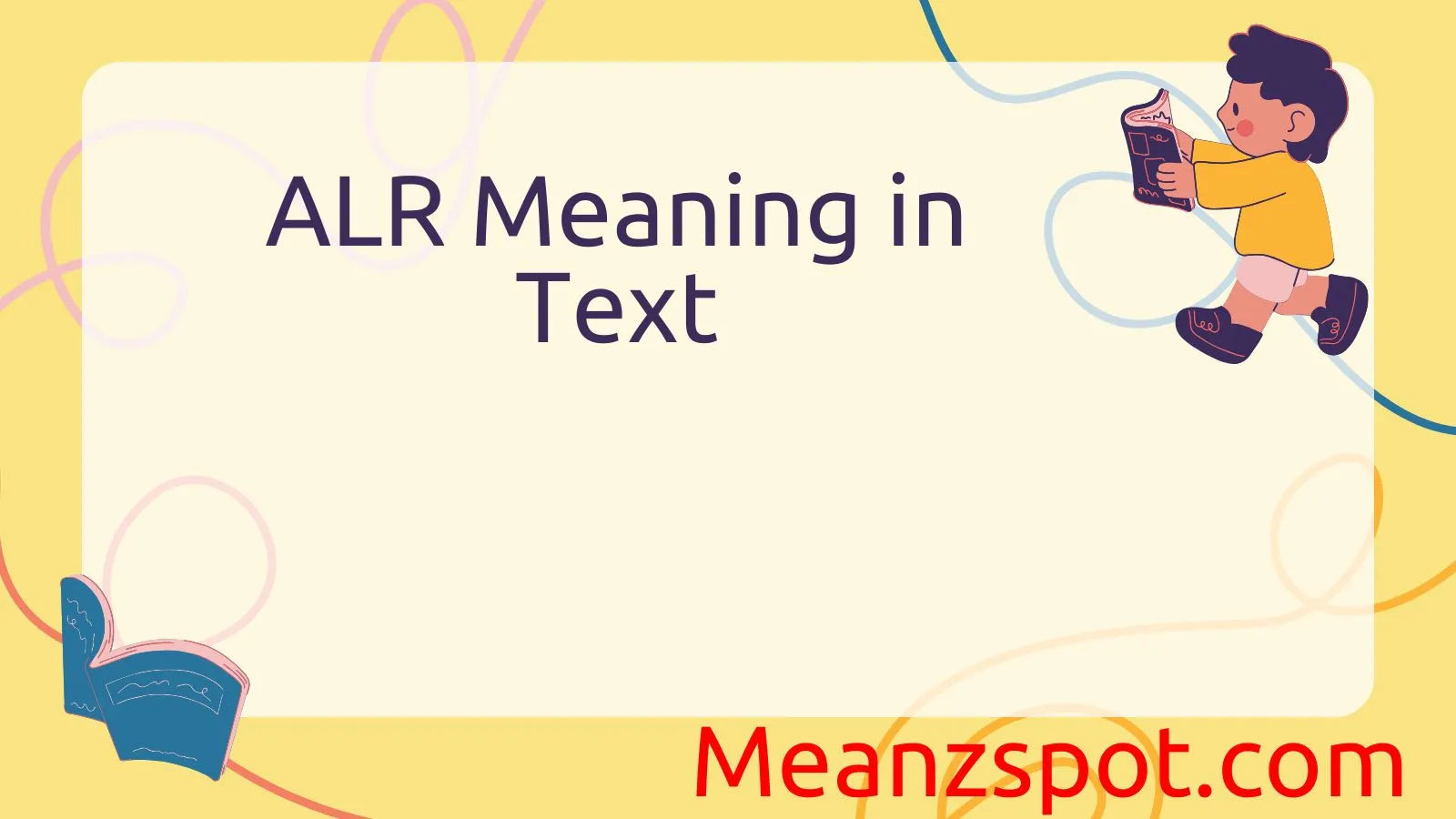In the ever-evolving world of digital communication, texting abbreviations and acronyms keep changing and trending every day. One such popular acronym you might see popping up in conversations, chats, or social media is ALR. But what does ALR actually mean in text?
Understanding this abbreviation is important because it helps you stay in the loop with current online lingo and communicate clearly without confusion. Whether you’re texting friends, chatting in groups, or scrolling through comments, knowing what ALR stands for and how to use it will keep your conversations smooth and on-trend.
This guide breaks down the meaning of ALR, shows you examples of how it’s used today, and clears up any confusion around it — so you’re always ready to text like a pro!
Definitions & Meaning
“ALR” is an abbreviation derived from the word “alright” (or “all right”), and it typically signifies acknowledgment, approval, or acceptance. When someone types “alr” in a message, they are essentially conveying one of the following:
- Agreement: Responding positively to a suggestion or request.
- Confirmation: Letting the sender know their message has been received and understood.
- Mild Resignation: Indicating reluctant acceptance when the sender may not be fully enthusiastic but will comply.
The tone of “alr” can vary based on factors such as punctuation, capitalization, and the relationship between the sender and recipient. For instance, “alr!” with an exclamation mark may express genuine enthusiasm, whereas “alr…” with an ellipsis might hint at hesitation. In many cases, users choose “alr” over “okay” or “ok” because it feels more casual and conversational.
Examples
- Agreement:
Friend: “Let’s meet at 6 PM.”
You: “Alr, see you then.” - Confirmation:
Colleague: “I’ve sent the draft to your inbox.”
You: “Alr, got it.” - Resignation:
Partner: “We have to move this weekend.”
You: “Alr… I’ll start packing.”
By understanding these subtle shifts in tone, you can better interpret messages and ensure your own responses convey the intended meaning.
Origins & History
The abbreviation “alr” emerged alongside the rise of SMS texting in the late 1990s and early 2000s, when character limits forced users to find creative ways to shorten words. As mobile phones evolved and internet-based messaging apps like WhatsApp, Facebook Messenger, and iMessage became prevalent, the practice of using written shorthand persisted and expanded.
- Early Texting Culture: In the era of T9 predictive text, each character was precious. Abbreviations like “u” for “you,” “r” for “are,” and “alr” for “alright” became commonplace to save time and keystrokes.
- Online Forums & Chatrooms: Even before smartphones, users in chatrooms (e.g., IRC, AIM) adopted “alr” to streamline conversations.
- Evolution with Emojis & Stickers: Over time, as messaging platforms added support for emojis, GIFs, and stickers, shorthand like “alr” blended with visual elements, enriching digital communication.
Despite the relaxation of character limits in modern apps, the brevity and informality of “alr” have cemented its place in everyday digital parlance. Text speak remains popular among younger generations who value speed and casual tone, making “alr” a staple in the lexicon of online communication.
Usage in Different Contexts
“ALR” is versatile and appears across various communication channels, each with its own subtleties:
Social Media
On platforms like Twitter and Instagram, “alr” often appears in comments and captions to convey agreement or readiness without diverting attention from the main content.
“New blog post is live, check it out!”
“Alr, reading now!”
Professional Communication
While more formal than “okay,” “alright” and its abbreviation “alr” are still considered informal for workplace emails. However, in instant messaging tools like Slack or Microsoft Teams, “alr” can be appropriate among colleagues who maintain a casual tone.
- Example:
Team Member: “Deadline shifted to Friday.”
You: “Alr, I’ll adjust the schedule.”
Pop Culture & Entertainment
Content creators and fandom communities frequently use “alr” in live streams, comments, and group chats to show they’re following along or ready to proceed with the next topic.
- Example:
Host: “Time for Q&A!”
Chat: “Alr, question—what inspired your latest video?”
Personal Texting
Among friends and family, “alr” is a staple for quick confirmations and reactions.
- Group Chat Scenario:
“Movie night at my place tomorrow?”
“Alr, what time?”
By recognizing these context-specific nuances, you can tailor your use of “alr” to fit the setting and maintain the right level of formality.
Common Misunderstandings & Clarifications
Like many abbreviations, “alr” can be misinterpreted, especially when tone and intent are unclear:
- Perceived Indifference:
- Misunderstanding: “Alr” can sometimes come across as cold or dismissive if the sender doesn’t include additional warmth (e.g., emojis).
- Clarification: Adding an exclamation mark or a smiley—“Alr! 😊”—helps soften the tone.
- Assumed Confirmation vs. Question:
- Misunderstanding: The recipient might think “alr” is a question asking for approval rather than an acceptance.
- Clarification: Pairing it with another phrase, like “Alr, sounds good!”, removes ambiguity.
- Overuse Causing Confusion:
- Misunderstanding: Using “alr” in every message may dilute its meaning and frustrate conversational flow.
- Clarification: Reserve “alr” for instances where a concise acknowledgment suffices and opt for full words when elaboration is needed.
- Cultural & Generational Gaps:
- Misunderstanding: Older generations or non-native English speakers might not recognize “alr,” leading to miscommunication.
- Clarification: If confusion arises, spelling out “alright” can ensure clarity.
Being mindful of these potential pitfalls will make your digital interactions smoother and more positive.
Alternatives & Synonyms
If you’re looking to vary your responses or convey slightly different tones, consider these alternatives to “alr”:
| Abbreviation | Full Form | Tone/Usage |
|---|---|---|
| OK / ok | Okay | Neutral acknowledgment |
| k | OK | Very casual, sometimes abrupt |
| gotcha | Got it | Informal, indicates understanding |
| roger | Roger that | Slightly humorous/military tone |
| sounds good | — | Friendly, expresses agreement |
| sure | Sure | Casual assent |
| 👍 | Thumbs up emoji | Visual confirmation |
Choosing the right synonym depends on the context and desired tone:
- Formal Work Chats: “Got it” or “sounds good.”
- Casual Conversations: “k,” “👍,” or “sure.”
- Humorous Exchanges: “Roger that!”
Frequently Asked Questions (FAQ)
1. Is “alr” appropriate in professional emails?
Generally, “alr” is too informal for email correspondence. Stick to “Okay,” “Understood,” or “Sounds good” in professional settings.
2. Does “alr” have any negative connotations?
Not inherently, but if used without warmth or context, it can seem curt or indifferent. Adding punctuation or emojis can help convey a friendlier tone.
3. Can “alr” be used in text messages to elders?
Use caution. Some elders may not recognize the abbreviation. It’s safer to use “all right” or “okay” for clarity and respect.
4. How is “alr” pronounced when spoken aloud?
It’s typically read as “alright.” However, many people avoid speaking abbreviations aloud, opting to say the full word instead.
5. Are there any similar abbreviations I should know?
Yes—“brb” (be right back), “ttyl” (talk to you later), “idk” (I don’t know), and “smh” (shaking my head) are common text slang.
6. Can “alr” be used sarcastically?
Absolutely. Tone and context matter. For a sarcastic feel, you might combine it with an eye-roll emoji: “Alr 🙄.”
7. Is “alr” specific to English?
Primarily, yes. Other languages have their own shorthand. However, English text slang often appears in multilingual chats.
Conclusion
Acronyms like “alr” illustrate how digital communication continues to evolve toward brevity and efficiency. While “alr” simply stands for “alright,” its tone and intent can vary dramatically based on context, punctuation, and relationship dynamics.
By understanding its origins, common uses across platforms, potential misunderstandings, and available alternatives, you can employ “alr” effectively and read others’ messages with confidence. Whether you’re coordinating plans with friends, responding to colleagues, or engaging with social media content, mastering this little abbreviation ensures your digital conversations remain clear, quick, and engaging.



